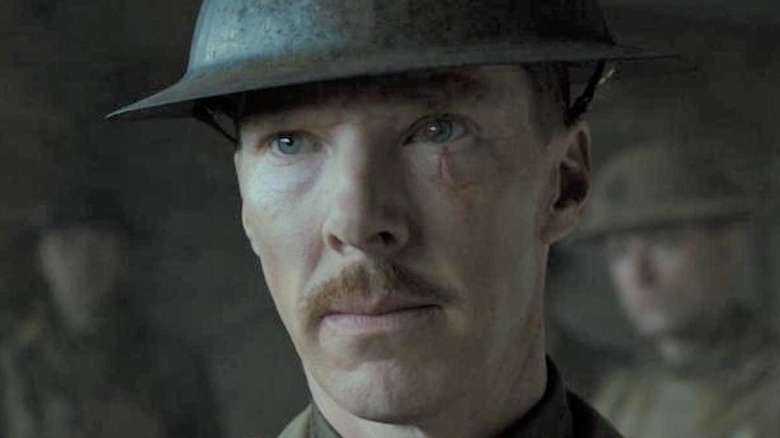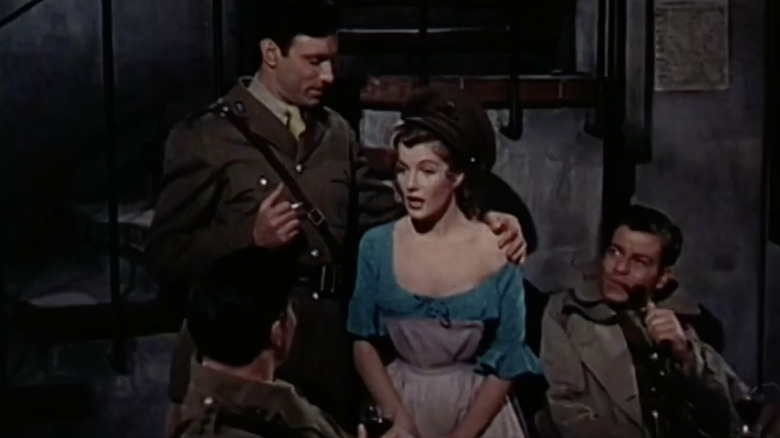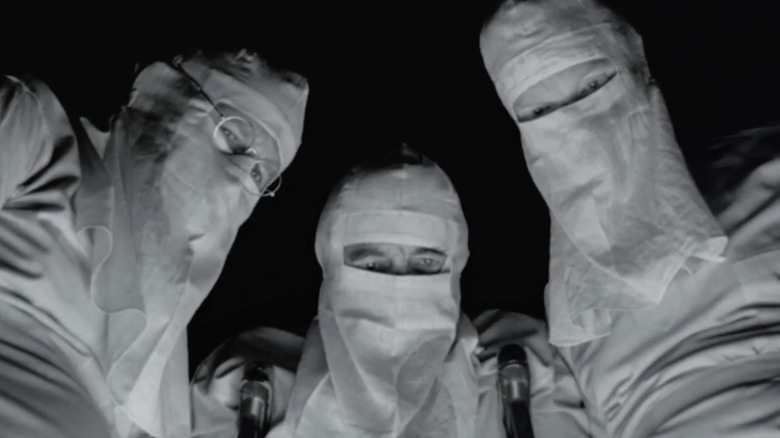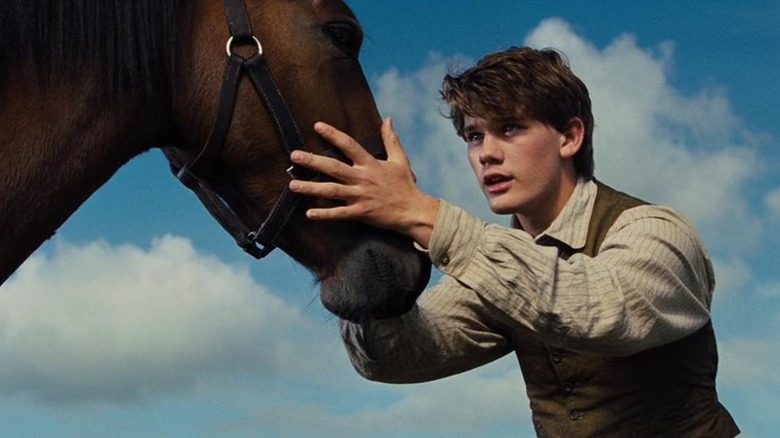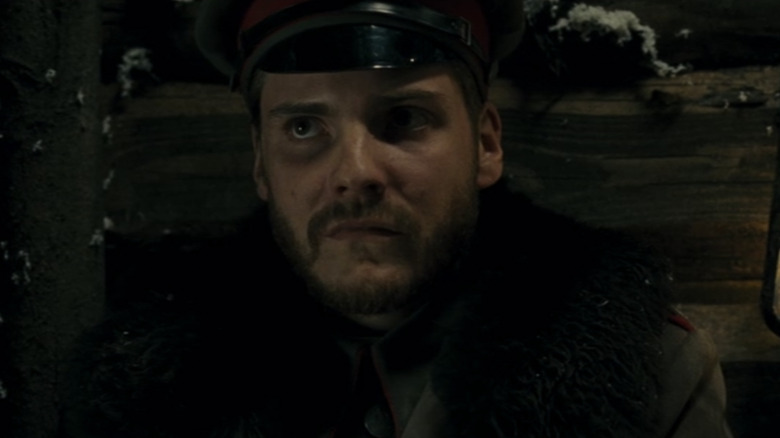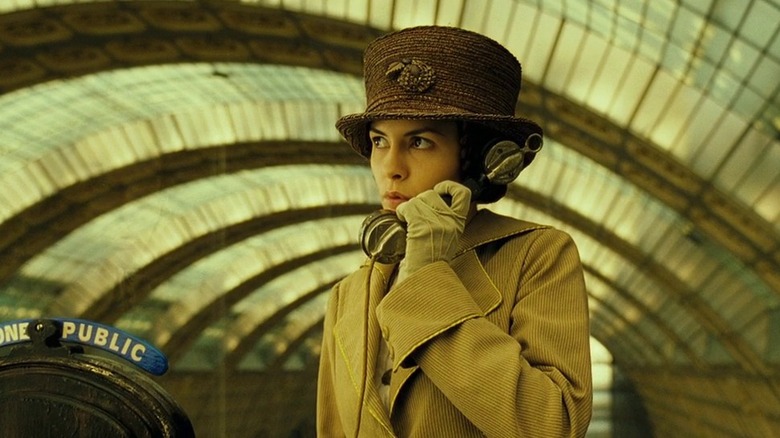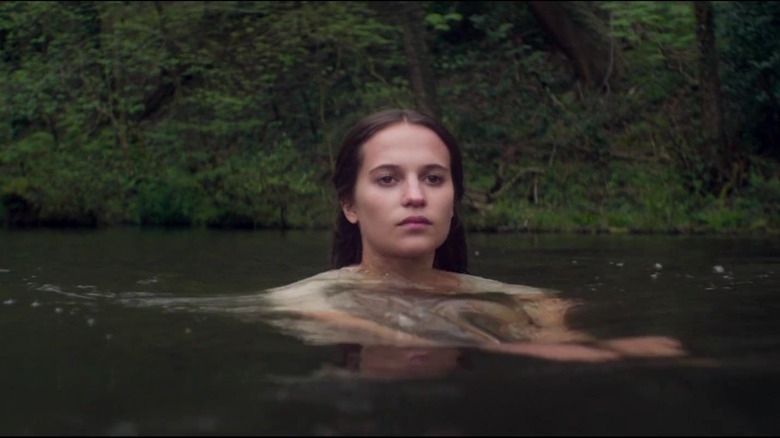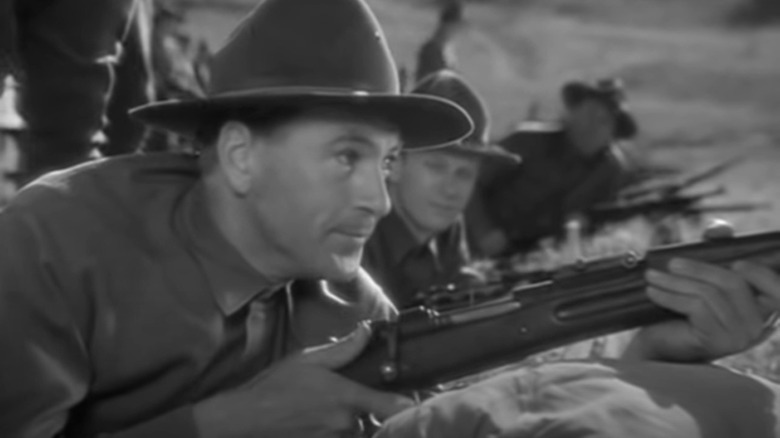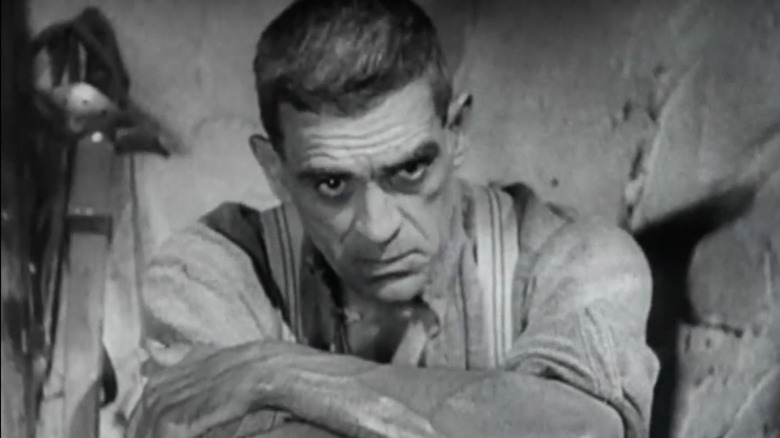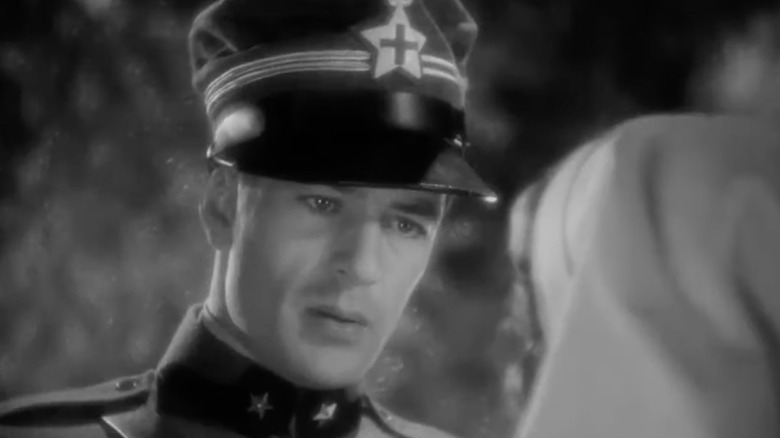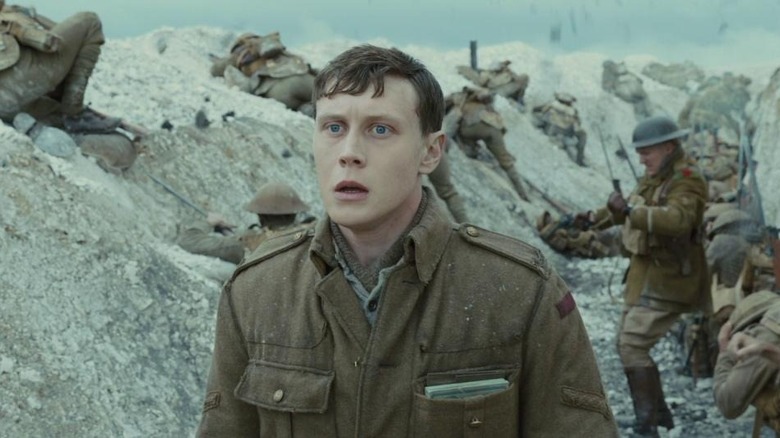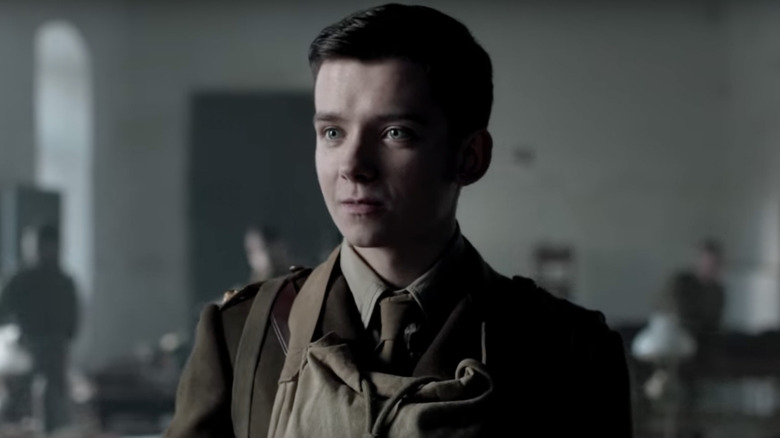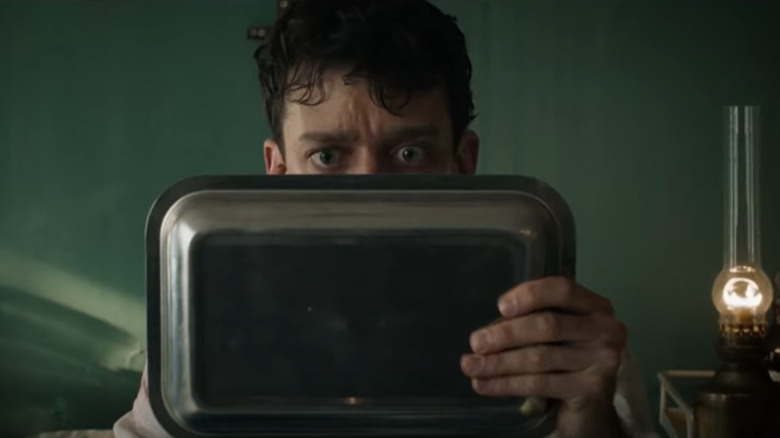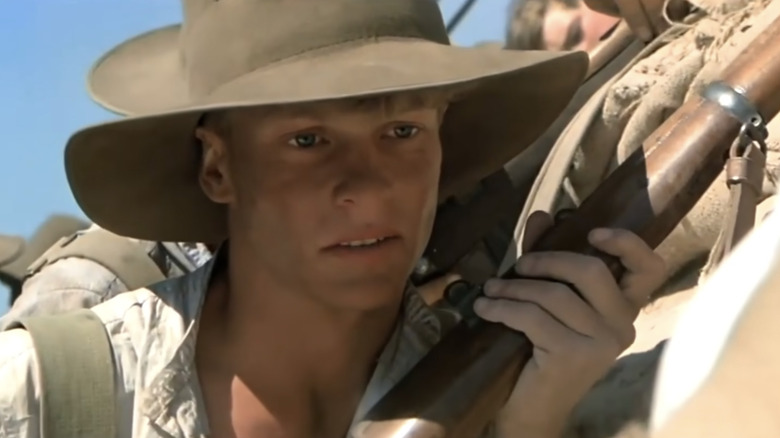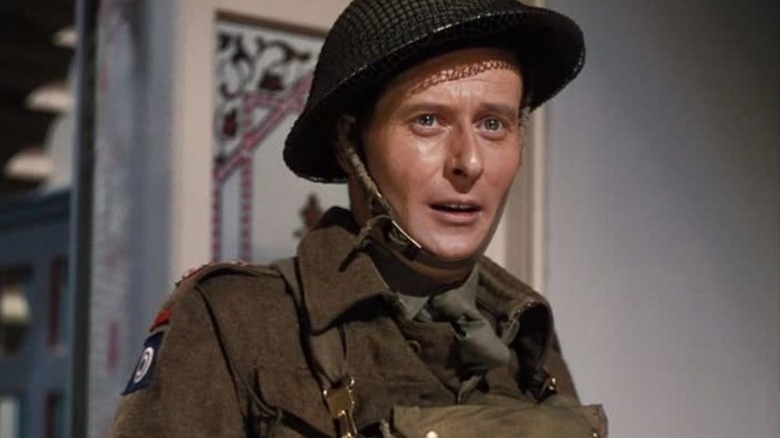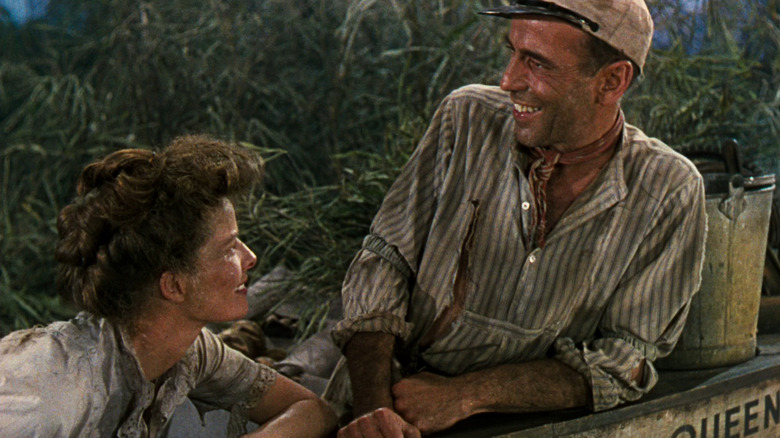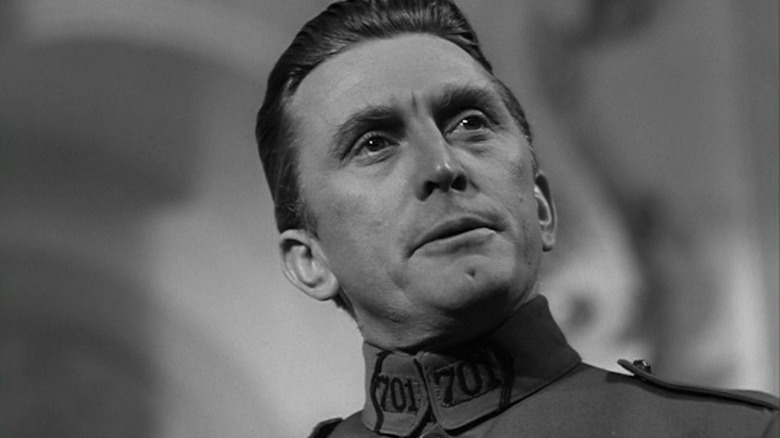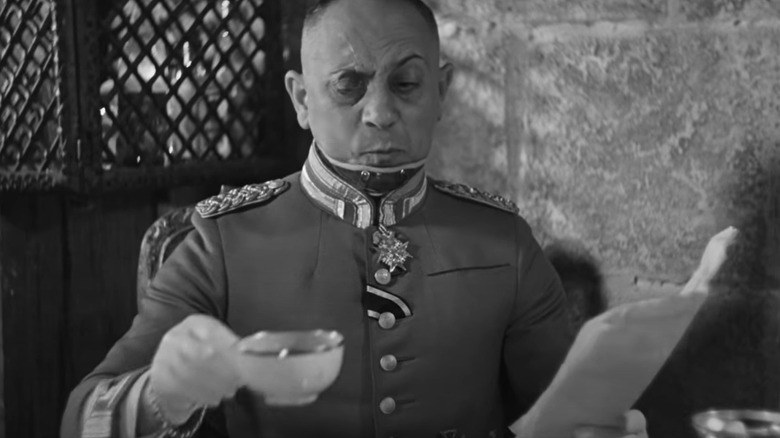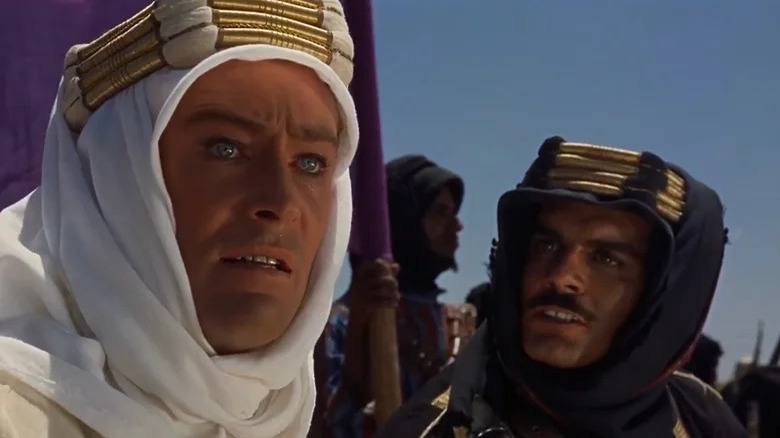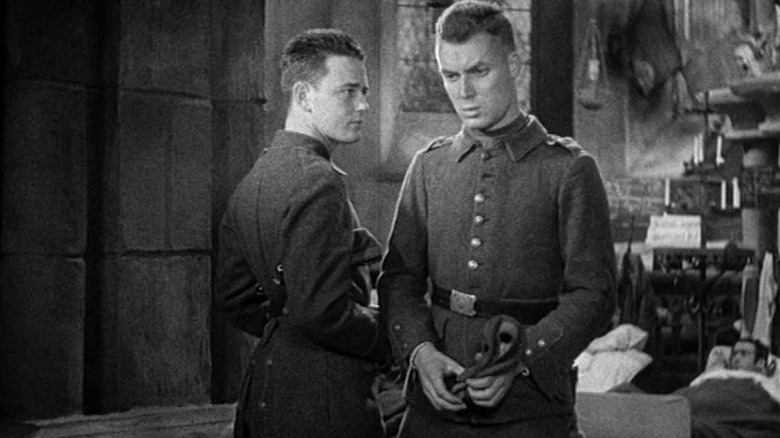20 Best World War I Movies Of All Time Ranked
World War I was a four-year conflict with a complex global front, and its muddled causes and lack of a clear-cut, easily understood purpose made its catastrophic impact all the more difficult to bear. It introduced the "innovation" of trench warfare and saw the advent of mustard gas. Its aftermath — including loss of life, psychological impact, economic troubles, and the punishing Treaty of Versailles — helped bring about the international circumstances that would produce World War II (and its own slew of great movies).
As such, unsurprisingly, World War I has often appeared — to great effect — in anti-war films, including some of the best ever made. World War I films don't all strike the same note, though. While the films in this particular war movie subgenre tend to at least nod to the surrounding bleakness, directors have taken a number of striking and varied approaches. Our round-up here includes not only stunning tragedies and blistering indictments but also energetic comedies, stirring and adventurous melodramas, touches of romance, and panoramic epics. They take place everywhere from France to Turkey to Syria, and their drama plays out in the trenches, in the sky, in war hospitals, and on the home front. Here are the 20 best films about World War I.
20. What Price Glory
Beneath the comedic and romantic bluster of John Ford's "What Price Glory," there's an arch and sometimes poignant look at how soldiers relate to each other, to their superiors, and to the women they love. Captain Flagg (James Cagney) and Sergeant Quirt (Dan Dailey) have a longstanding feud, and (at least at first) they're unwilling to simply put it aside for the sake of the war. Rank gives Flagg the upper hand, but it can't stop Quirt from moving in on his neglected mistress, Charmaine (Corinne Calvet) — who unfairly becomes both pawn and reward in their game.
What makes "What Price Glory" work, however, is that all these boisterous machinations and schemes are happening in the midst of death and suffering. Flagg and Quirt's romantic rivalry is balanced by the innocent sincerity of the younger Private Lewisohn (Robert Wagner) — but earnestness sometimes goes hand-in-hand with tragedy. In the end, Quirt and Flagg's petty back-and-forth feels like some much-needed whistling in the dark. It distracts them — and us, at least from time to time — from all the death and pain around them. In that way, it's almost like a precursor to Robert Altman's "M*A*S*H," although "What Price Glory" admittedly handles its wartime distractions in a cornier fashion. There's value in the corny, though, and we'll admit to being touched by the film's ending.
19. Johnny Got His Gun
Of all the great anti-war films, 1971's "Johnny Got His Gun" may be the bleakest and most harrowing. Dalton Trumbo wrote and directed this adaptation of his 1939 novel, giving it a singular and intense vision. As much as we may want to close our eyes against it, Trumbo makes that impossible.
After all, why should we get the luxury of looking away from the horrors of war? The film's central character, Joe Bonham (Timothy Bottoms), certainly can't. While Joe is out on burial duty to spare a colonel from the indignity of smelling one of his dead soldiers rot, an artillery shell takes his arms, legs, eyes, nose, ears, and mouth. He can't see, hear, taste, or talk. He's so swathed in bandages that he's faceless, like he's even lost his identity. His only way to communicate is to move his head, tapping out messages in Morse code — messages it's easy for the people around him to miss, overlook, and ignore.
While Joe's life is revealed to us through flashbacks — memories and dreams are Joe's only real form of escape — it's his oppressive isolation in the ward that stays with us the most. Joe is used up and discarded by an uncaring system, and "Johnny Got His Gun" follows that idea to the bitterest possible conclusion.
18. War Horse
The great Steven Spielberg's lush and heartfelt "War Horse" offers — as you might expect from the title — a kind of horse's-eye view of World War I.
Joey is a beautiful Irish Hunter who, despite his line being mostly bred as show horses, grows up working the land under the loving care of farmer's son Albert Narracott (Jeremy Irvine). When financial hardship at the start of the war forces Albert's father to sell Joey to the Army, Albert is devastated. He clings to the belief that they'll be reunited someday. The film follows both their paths through the war, as the two of them go through tragedies and horrors that threaten to crush them. Even when they find each other again, the movie agonizingly dangles the possibility that the longed-for peace may separate them yet again.
"War Horse" is a moving drama that isn't afraid to be openly emotional. The deep bond between Joey and Albert — and the meaning Joey and his fellow war horses sometimes have to the other people they encounter — feels true, and it lets Spielberg explore the grim nature of World War I while still satisfying the audience with some heartwarming catharsis. The film blends warm, old-fashioned Hollywood pleasures with contemporary filmmaking and production techniques; the result feels timeless.
17. Joyeux Noël
Based on a touching real-life incident, the 2005 film "Joyeux Noël" dramatizes an unlikely spontaneous Christmas truce between French, German, and Scottish troops at the front. When celebrated opera singer Nikolaus Sprink (Benno Fürmann) and his equally gifted fiancée (Diane Kruger) begin an impromptu performance of some Christmas carols, they spark a wave of fellow feeling that quickly crosses the lines. The strange, tentative peace leads Sprink's buttoned-down commanding officer Lt. Horstmayer (Daniel Brühl), Scottish Lt. Gordon (Alex Ferns), and the gentlemanly Lt. Audebert (Guillaume Canet) to form a holiday ceasefire.
Of course, once all the men have socialized with their enemies — sharing drinks and conversation — it's hard to go back to the usual business of war. Despite the nationalist lessons all the men have been taught, it doesn't take most of them very long to realize that they're far from natural enemies ... and they have more in common with each other than with the higher-level commanders who sent them here to fight. Empathy, gratitude, and even the wistful possibility of friendship make the officers extend the truce in unconventional, life-saving ways. Unsurprisingly, their countries will make them pay dearly for this show of humanity.
"Joyeux Noël" is genuinely heartwarming without ever sacrificing the bittersweetness at its core. This is a poignant film rather than a sentimental one, and it earns every bit of stirring emotion and moving, deeply felt connection. The terrific ensemble cast makes this a knockout.
16. A Very Long Engagement
"A Very Long Engagement" doesn't shy away from the horrors of World War I, but it still finds space for its own romantic, dreamy vision. Audrey Tautou shines as the sweet, vulnerable, and dogged Mathilde, who knows in her heart that her fiancé, Manech (Gaspard Ulliel), is still alive ... no matter what anyone tells her. Mathilde refuses to believe the official story that Manech died after deliberately injuring himself to escape the front, and she hires private detective Germain Pire (Ticky Holgado) to dig into the case and find out the truth. It may take years, but if it's at all humanly possible, Mathilde will make sure she and Manech are reunited.
Beautiful cinematography and unabashedly moving melodrama make this into a resonant wartime fairy tale. War movies aren't known for their charm and beauty — and justifiably so — but "A Very Long Engagement" makes its sense of wonder work by rooting us in Mathilde's almost magical perspective. Side stories exploring other characters widen the perspective and add further nuance, with Marion Cotillard serving as a standout among the supporting cast.
Against all odds, director Jean-Pierre Jeunet achieves something rare and remarkable here, and it seals the film's place on our roster of the greatest World War I movies.
15. Testament of Youth
The bittersweet "Testament of Youth" looks at war not from the command tents or the front lines but from the hospitals, where the tactics and strategies involved in battles seem less important than the massive number of grisly, tragic casualties that result from them.
Vera Brittain (Alicia Vikander) leaves her prestigious and longed-for studies at Oxford to become a volunteer nurse for the military, feeling that she, like her beloved brother and their friends, has a duty to serve the war effort. As all of them soon find out, the war isn't an opportunity for glory or adventure. Instead, it's the end of their carefree romantic days of creativity and camaraderie, and nothing will ever be the same. Vera's job subjects her to an endless flood of the dead and dying, and she is slowly whittled down by the trauma of watching as, one after another, the war swallows up the young men who were once her closest companions.
"Testament of Youth" is based on a memoir by the real Vera Brittain, and its truth carries a melancholy weight — especially since we know that the peace Vera longs for at the end of the film remains out of our reach. This is a necessary, beautifully made film about the high personal cost the war exacted even from the people on its sidelines, and it highlights the pain that comes from losing so much of one generation. An exceptional cast keeps the human element at the forefront where it belongs.
14. Sergeant York
"Sergeant York" is a stirring and well-acted wartime biopic. It tells the story of Alvin York, who grows from a hard-working but feckless young man to a courageous and principled one. York actually does most of his maturing before war even breaks out. In fact, his conscience and strong religious beliefs nearly keep him from participating in the war at all. He can't be enthusiastic about killing — but when his only choice is to fire or watch his friends and brothers in arms fall around him, he proves incredibly effective all the same.
The movie is as much about York's principles as his courage in battle. Understandably, York's breathtaking ability to act as a kind of one-man army is riveting, but "Sergeant York" — like its hero — never loses track of what it really values. As impressive as York's battlefield heroism is, in the end, it's maybe less remarkable than his willingness to walk away from the money and fame that come with it. It takes a special kind of actor to make this kind of honor and decency convincing and compelling instead of unfortunately corny, but luckily, Gary Cooper is more than up for the job. He turns in a striking performance, and it's not going too far to say that he makes the movie.
13. The Lost Patrol
1934's "The Lost Patrol" tackles how pointless, grim, and absurd war can be to the people caught up in it. It's a kind of wartime "And Then There Were None," with relentless pacing and a strong sense of dread.
The titular patrol ventures far out into the Mesopotamian desert, and when their commanding officer is killed by sniper fire, he takes the original purpose of their mission with him. His unnamed sergeant (Victor McLaglen) picks up the mantle of leadership as best he can, but he has no idea what they were meant to accomplish out here. Faced with a vast, unfamiliar desert, the larger issues of war and tactics dwindle. All the sergeant wants is to keep his men alive and get them back to the other British forces. This modest goal, however, is as hard to reach as an oasis in a mirage — and the real oasis the men find turns out to be a death trap where the enemy can wage a bleak war of attrition.
John Ford brings his usual masterful skill to bear here, shaping "The Lost Patrol" into a tense, atmospheric horror story that makes exceptionally strong use of its desert setting. The stark visuals are striking and cinematic — especially at the film's conclusion — and the pressure-cooker drama has a theatrical flair that plays uncannily well on this desert stage. Ford made a lot of masterpieces, but TCM notes that this was always one of his favorites, and we can see why.
12. A Farewell to Arms
Moody and bittersweet, the romantic tragedy "A Farewell to Arms" benefits from having been made before the Hays Code took hold. It has a frank sensuality and political cynicism that, The Times points out, were both about to virtually disappear from Hollywood for decades.
The film centers on the star-crossed romance between Frederic Henry (Gary Cooper), an American ambulance driver for the Italian Army, and Catherine Barkley (Helen Hayes), a Red Cross nurse. The two have an impulsive but heartfelt affair that their friends, Captain Rinaldi (Adolphe Menjou) and Fergie (Mary Philips), would like to prevent. They know how fleeting but damaging wartime romances can be, and Fergie is acutely aware that women often get the worst of it. She wants better for Catherine ... but she doesn't get it. "A Farewell to Arms" derives a lot of pathos from how the attempts to shield Frederic and Catherine from pain wind up hurting them even more.
Director Frank Borzage and cinematographer Charles Lang make the film both gorgeous and intelligently stylish. Their craft leaves us feeling like every frame of "A Farewell to Arms" would be worth examining. Hayes, Cooper, Philips, and Menjou provide a remarkably strong quartet of central performances, with their characters balancing each other well. All these elements combine to give "A Farewell to Arms" a lingering impact.
11. 1917
"1917" follows two young British soldiers — Tom Blake (Dean-Charles Chapman) and William Schofield (George MacKay) — who are sent through dangerous territory with a key message: They must warn a fellow British regiment that it's on the verge of falling into a deadly German trap. The time is short, and the mission is critical, especially important for Blake, whose brother is in the endangered regiment.
Director Sam Mendes and legendary cinematographer Roger Deakins make this gripping, ticking-clock tension the star of the film by relaying the story in nearly one long, seemingly unbroken shot. The technique puts us in Schofield and Blake's shoes on their journey through a hellish landscape where danger lurks around every corner, making it involving, visually distinctive, and stylistically bold.
While the immersive, suspense-building camerawork may be the unlikely star of "1917," the abundance of style doesn't mean the film lacks substance. Mendes packs his movie with vivid, unforgettable sequences of both action and horror, and the friendship between Blake and Schofield creates considerable emotional investment. The emotions here can still bring a lump to your throat even as you're marveling at the technical feats Mendes has pulled off, and that makes "1917" far more than just a masterful demonstration of technique.
10. Journey's End
"Journey's End" gives us all the restrained human drama of the British trenches in World War I, and its finely crafted performances and poignant characterization make it feel like an instant classic — and, indeed, the stage play version has been a favorite since 1928. Its latest film adaptation preserves all the strengths of the play while also adding a strong cinematic style and new material and characters. Even if you've seen the stage drama before, this will prove a unique experience.
Raleigh (Asa Butterfield) and Stanhope (Sam Claflin) were schoolboys together, and Stanhope even stood a chance of becoming Raleigh's brother-in-law. When Lieutenant Raleigh gets the chance to have his elite family pull a few strings, he ensures that he's placed under Captain Stanhope's command. Unfortunately, the Stanhope he remembers has already — at least psychologically — become a casualty of war. The film handles its characters with tremendous sympathy, exploring all the damage — physical, mental, and spiritual — they suffer because of the conflict. This sensitively observed tragedy is as haunting as it is heartbreaking.
9. Wings
The classic silent film "Wings" is a bright star in some of our favorite cinematic constellations. Not only did it win the first Academy Award for Best Picture (per History), it also established a lot of the breathtaking thrills we still look for in movie aviation — and as Turner Classic Movies notes, it did most of it for real, with courageous stunt pilots and even actors who learned to fly just for the film. It has an exceptional amount of daring, and the obvious reality of what's happening up on the screen puts audiences on the edge of their seats.
A sweet, nuanced love triangle between pilots Jack (Charles Rogers) and David (Richard Arlen) and ambulance driver Mary (Clara Bow) — all of whom grew up in the same small town — adds a lot of heart to the proceedings and gives the film the emotional resonance that makes it more than just an adrenaline rush. Plus, aerial dogfights were a key part of World War I, and if you want to get a sense of how they looked in action, you need to watch "Wings." Actually, even if you don't really care about historical aerial combat, you should still watch "Wings" because this kind of practical filmmaking and adventurous derring-do never fails to please. It also offers some interesting bonuses like an early appearance by movie legend Gary Cooper and even, according to Open Culture, what may be the first same-sex kiss in the movies.
8. See You Up There
"See You Up There" offers a swift but unforgettable look at the horrors of war that's as grotesquely memorable as anything else in the movies ... but its real story comes in the aftermath of the horror, when damaged, forgotten French veterans Edouard (Nahuel Pérez Biscayart) and Albert (Albert Dupontel) must try to make their way through an indifferent world. Meanwhile, their former commander, the arrogant and unscrupulous Lt. Pradelle (Laurent Lafitte) — who ruined the lives with a wholly unnecessary and deadly mission — has also come home again.
This ambitious, unconventional film tells a grandly quirky tale of schemes both petty and audacious. It grounds its hectic and highly original plot in a sharp, satirical examination of a post-World War I France that would rather spend a fortune honoring its war dead than providing for their surviving brothers-in-arms. When Albert and Edouard hatch a plot to profit off this national obsession, it may be shocking ... but it's also easy to understand the temptation. We're less forgiving of Pradelle raking in cash via the slipshod mass burial of fallen soldiers. As Edoard and Albert's paths once again intersect with that of their commanding officer, the intensity of the film heightens to a fever pitch.
In a world full of staid, dutiful war films, "See You Up There" stands out for its sheer inventive verve. It acts amoral, but it showcases a fierce anger at injustice, and that combination of cynicism and righteous wrath is powerful fuel. With superb visual inventiveness, plenty of stylistic flair, and complicated, genre-blurring storytelling, "See You Up There" quickly establishes its brilliance.
7. Gallipoli
"As fast as a leopard." If you've ever seen Peter Weir's stunning "Gallipoli," then there's a good chance that just thinking about that line can bring tears to your eyes.
There aren't many World War I films that delve into the Australian Army's involvement, but luckily, "Gallipoli" is good enough for a dozen movies. It centers on two gifted, highly trained runners — brave, fresh-faced Archy Hamilton (Mark Lee) and cynical drifter Frank Dunne (Mel Gibson, doing some of his best work). They meet via a race — one Archy wins, much to Frank's chagrin — but the competitive edge between them doesn't stop them from developing a fast, close friendship. "Gallipoli" subtly and deftly makes audiences feel the tragic waste of war and the way it interrupts and severs the natural course of people's lives. It's as if Archy and Frank are meant to be in a buddy sports movie, but the war has changed all of that. Now, the plot significance of their running — and the emotional significance of their friendship — will be something completely different.
Lee and Gibson both turn in particularly charismatic performances here, creating characters that it's hard to look away from and impossible not to care about. By exploring an under-dramatized corner of history, the film also brings more attention to Australian losses during World War I and poses thought-provoking questions about allegiances and international relationships.
6. The Life and Death of Colonel Blimp
Not only is "The Life and Death of Colonel Blimp" a great World War I film, no less a source than The Atlantic has dubbed it "the greatest British film ever made." Restrained in expression but beautifully full of feeling, the movie follows Clive Wynne-Candy (Roger Livesey) throughout his years of service, retracing his path through the Boer War, World War I, and World War II. Candy's life is grounded in his long (if sometimes rocky) friendship with German soldier Theo Kretschmar-Schuldorff (Anton Walbrook) and his romantic longings toward a series of women all played by the great Deborah Kerr.
While "The Life and Death of Colonel Blimp" has a wider focus than just World War I, the conflict and its aftermath still have a crucial role to play. As the key middle section, it's the lynchpin on which the film turns, significantly affecting both global and personal history. One of the most moving scenes is a nearly static shot of Theo relating what happened to him in post-World War I Germany, as his country slowly changed into one he no longer recognized. The scope of the film lets it touch on how the First World War led almost inevitably to the Second.
Incredible visuals, an astute script, and nuanced and lovable performances all justify the film's cinematic legacy. Though released in 1943, it feels genuinely timeless.
5. The African Queen
The romantic adventure-drama "The African Queen" takes place on the periphery of World War I, and it shows that being far from a conventional battlefield doesn't stop the violence of war — or the courage and ingenuity of some of the civilians who are swept up into acting like soldiers.
As the starchy and upright missionary Rose and the grubby and hard-drinking Charlie, Katharine Hepburn and Humphrey Bogart have unbeatable opposites-attract chemistry. It's a pleasure to watch them go from painfully tolerating each other to improving each other and falling in love. We need the fun and hope that romance offers, too, because the overarching plot of "The African Queen" comes with a lot of grim tension. Rose and Charlie are initially just trying to escape the fighting in German East Africa when they set out on Charlie's aging boat, but indomitable Rose soon hatches a plan to strike a real blow for the British by sinking a powerful German ship in the area. The Germans aren't the only enemy they have to contend with, however. It's hard enough to survive the river itself.
The non-stop onslaught of challenges keeps the stakes high and even leaves us wondering what kind of fate awaits Charlie and Rose at the end of all this. The iconic performances may be the best part, and Bogart won his only Oscar for his work as Charlie.
4. Paths of Glory
Both a war movie and a heartbreaking courtroom drama, "Paths of Glory" is difficult but essential viewing. It concentrates on the aftermath of a doomed French assault on an impregnable German position, one that Generals Broulard (Adolphe Menjou) and Mireau (George Macready) undertake only for their personal glory ... despite knowing that the odds of success are infinitesimal and the human cost will be enormous. When the attack fails — as it was always destined to — a livid Mireau wants to charge the surviving French soldiers with cowardice. He accepts a scapegoat offering of only three soldiers, one from each battalion, and the selection is infuriating in its unfairness.
Hope comes in the form of the courageous, principled Colonel Dax (Kirk Douglas), who volunteers to defend the three men. He has a mountain of evidence in his favor, and his civilian career is in criminal law. In a fair and just trial — and a fair and just world — Dax would win the day, but he's surrounded by corruption, weakness, dishonor, and apathy.
"Paths of Glory" does an exceptional job of showcasing how appallingly an almost comedic pile-up of bureaucracy and selfishness can lead to unbelievable tragedy. As the film slowly but inexorably builds towards its inevitable climax, it redefines the word "harrowing." Despite all the darkness, however, the film still musters a transcendent, beautifully ambiguous ending that will always stick with us. We'd vote for this as Kirk Douglas' best movie.
3. La Grande Illusion
The superb French film "La Grande Illusion" shows the flexibility of the war movie by handling it as a classic prison break. French prisoners of war Maréchal (Jean Gabin) and de Boëldieu (Pierre Fresnay) find themselves passed from prison camp to prison camp, often encountering German officer von Rauffenstein (Erich von Stroheim), who — despite having shot them down in the first place and despite sometimes acting as their jailer — bears them no real ill will. Once Maréchal and de Boëldieu are imprisoned in the fortress-like Wintersborn, they combine forces with another French prisoner, Rosenthal (Marcel Dalio), and begin to plot their escape.
Despite a lack of battle scenes, director Jean Renoir nevertheless captures the essence of World War I. In "La Grande Illusion," he concentrates on the sense that the war is arbitrary and hostile to individual interests, often forcing men to act as enemies when they would otherwise be friends. Since neither side here has much of a moral cause to fight for, the characters are forced to either act from either an abstract sense of duty — which is often cold comfort — or sheer self-preservation. "La Grande Illusion" may technically deal with representatives of different nations, but its real focus is on individuals.
The movie has always attracted its fair share of admirers, many of whom are significant filmmakers in their own right. According to Far Out, for example, Akira Kurosawa has listed "La Grande Illusion" as one of his favorite movies. And we never argue with Kurosawa.
2. Lawrence of Arabia
Of all the great on-screen epics, "Lawrence of Arabia" may deserve the title most. Its breathtaking cinematography highlights the sheer overwhelming scale of its deserts, its political and historical richness make a compelling case that it captures a pivotal turning of the tide, and its deep and unbelievably magnetic central performance grounds it all in one man's victories and tragedies.
Peter O'Toole is unforgettable as T. E. Lawrence, whose strategic intelligence and unprecedentedly close rapport with local Arab leaders make him invaluable to British high command. However, his flamboyance and torn loyalties ensure that he seldom fits in with his fellow Englishmen. As long as Lawrence is able to rally Britain's Arab allies in the World War I fight against the Turks, he's a hero, with a brilliant climb to success and an incredible tale of proving himself. We know Lawrence better, however. We see how he struggles with the secret-keeping he's forced into and how his own ability to embrace cruelty weighs on him. Like Sherif Ali (Omar Sharif), with whom he forms a close friendship, we see Lawrence as more than just a tool ... which makes his fall into compromise, irrelevance, and an all-too-early death hard to bear.
While much of the greatness here — including the acting, the intelligent and well-crafted script, and the resonant look at imperialism in the Middle East — can be appreciated even on the small screen, "Lawrence of Arabia" remains one of the classics that best rewards a theatrical experience. If you can find a revival showing, take advantage of it.
1. All Quiet on the Western Front
The classic "All Quiet on the Western Front" is a great film, but — even more than that — it's the film that best embodies the grueling reality of trench warfare, the suffering and camaraderie among the men at the front, and the conviction that all this fighting and dying is hauntingly pointless. We rank this 1930 adaptation as our top World War I film of all time.
The naïve, idealistic schoolboy Paul Bäumer (Lew Ayres), still a teenager, is quick to enlist when his teacher, the grandiose Kantorek (Arnold Lucy), sells the class on visions of wartime heroism and glory. His friends are equally swept up in the fervor. The reality of war, however, is worlds away from the fantasy Kantorek spun for them. Chaos, mud, death, hunger, injuries, mental exhaustion, doubt, and hopelessness reign at the front, and one by one, Paul's class dwindles around him. Worst of all, none of this seems to sink in to the people at home — which means there's little hope of convincing anyone that it needs to come to an end. There will always be people like Kantorek, who don't fight themselves but are happy to push others into the waiting meat grinder.
Elegiac, painful, and beautifully performed, "All Quiet on the Western Front" looks unflinchingly at the often undignified reality of war, and it doesn't comfort the viewer with any guarantee that its characters will survive. The film has been rightfully honored over the years, even receiving Best Picture and Best Director at the Academy Awards, and its reputation is as strong as ever.
